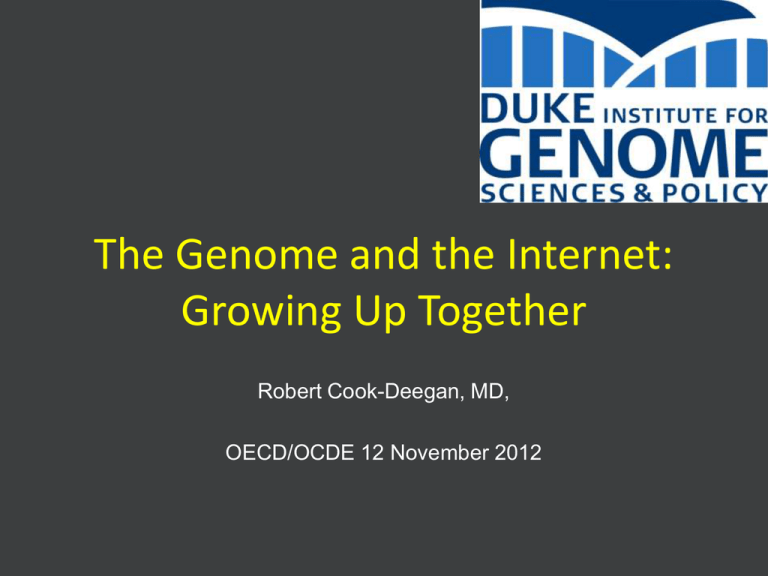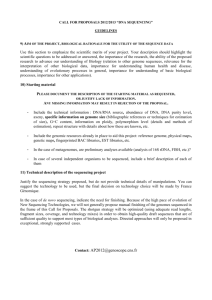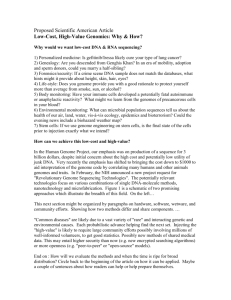The Genome and the Internet
advertisement

The Genome and the Internet: Growing Up Together Robert Cook-Deegan, MD, OECD/OCDE 12 November 2012 Who really did the work? Michael McGeary, PhD Subhashini Chandrasekharan, PhD Ilse Wiechers, MD, MPP Noah Perin, MPP + MBA Sapna Kumar, JD Jennifer Pohlhaus, PhD Colin Crossman, JD Alessandra Colaianni (U) Joe Fore (U) Whitney Laemmli (U) Anupama Kotha (U) Nancy Wang (U) Suparna Salil (U) Daidree Tofano (U) Phebe Ko, BA Molly Nicholson, BA Cindy Wang, MPP Matt DeCamp, MD/PhD (Philosophy) Britt Rusert, PhD cand. (English) Stacy Lavin, PhD cand. (English) Marie Hicks, PhD cand. (History) Marjorie Gurganus, JD Common features • Government-driven “first uses” – Census, military, space – Many inventions in Bell Labs or firms, but gestation in academe – Medical market for biotech • Intricate government-industry-academic mutualism • Big projects that push the envelope • Selling a vision of how technology can rock our world The transistor John Bardeen, Walter Brattain, and William Shockley 1948 The Chip Robert Noyce, Intel Jack Kilby, Texas Instruments The World Wide Web Two Unlikely Revolutionaries • JCR Licklider • Frederick Sanger Twin Revolutions Computing Genetics • • • • • • • • • • • ENIAC Census Whirlwind/MAC “Human-computer Symbiosis” • Personal computer • Networking • Mobile networking Mendel’s elements Population genetics Genes are DNA Recombinant DNA Sequencing DNA Automation Scale-up Shared features: Rapidly accelerating power, drop in price. Ubiquity. Pervasiveness. Disruption. Unanticipated uses. Network effects Computing versus Biotech • • • • • Price competition Month-years cycle Sales to consumers Prices low in USA Patents somewhat useful sometimes • Keep costs down • • • • • • • R&D competition Years-decades cycle Influence physicians Prices high in USA Patents essential FDA approval Keep prices up Science-Dependent Innovation Academic research base Public funding Capital for technical opportunities Human Genome Project Key enabling technologies • • • • • DNA detection and handling Recombinant DNA DNA sequencing Computing Networks and data-sharing George Church’s graph of DNA Sequencing Costs Source: George Church, Harvard and MIT, Consumer Genetics, 9 June 2009, Boston’s Hynes Convention Center Costs of sequencing whole genome 1986 Est. $3 billion 2000-2004 $300M-$1 billion (Celera-HGP) 2007 $3-5 million (454 Watson’s Jimome; Craig’s Venterome) 2008 $350,000-$1 million (Knome, Yoruba and Chinese) 2009-10 $50,000 (Illumina); $68,000-$99,500 (Knome) $5,000-$20,000 (Complete Genomics) ? $100-1000 (nanopore or Pacific Biosciences singlemolecule)? Pertinent price points • Cost of full-sequence single-condition testing ($3,000-7,000) • Cost of mutation testing ($500 – 1,000) • Cost of newborn screening ($100) As price drops, full-genome sequencing will move closer to universal screen, and other uses will proliferate The uses we don’t think of • • • • • • • Ancestry and genealogy Paternity Forensics Who you’re related to Your pet Your microbiome “It’s just cool to know” Network Effects “To many eyes, every bug is shallow” I learn from your data Just as important, you learn from my data Value of information grows with network size (squared) • Higher speed of aggregating information • Low coordination cost • • • • ~Think wikipedia, word processing files Data Costs: Genome sequence data that cost $1M to produce 1990 • $10 worth of disk space to store • 1 second to transmit over a network 2010 • cost $200,000 - $400,000 to store • several hours to move over a network 2020 • Several million dollars to store • Years to transmit over a network Estimates from Leonard “Kris” Kristalka, University of Kansas Data costs: Genomics 1,000,000,000,000 100,000,000,000 10,000,000,000 1,000,000,000 100,000,000 DATA BECOME IMMOBILE 10,000,000 1,000,000 100,000 10,000 1,000 100 10 1 1990 1990 2000 2000 2010 2010 2020 2020 Blue = 10 X/decade improvemens in network bandwidth, bits/second Red = 100 X/decade improvements in sequencing efficiency, bases/$ Graph and estimates courtesy of Leonard “Kris” Kristalka, University of Kansas Policy dilemmas • Genomic data are not just about you, but also your family • They feel like they should be “private” • We don’t know if sharing can be harmful • We don’t have the infrastructure or procedures for you to use your data even if we could get them to you • We don’t have interpretive services

